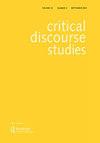Gender equality in the name of the state: state feminism or femonationalism in civic orientation for newly arrived migrants in Sweden?
IF 2.1
2区 文学
Q2 COMMUNICATION
引用次数: 2
Abstract
In a widely cited article, Joppke (2007) has underscored how the shared focus on rights, women’s rights in particular, in integration policies is indicative of a post-national turn characterized by a decrease in national and cultural distinctiveness and a convergence around universal liberal values. In his view, these policies ‘are not born of sources extrinsic to liberalism, such as nationalism and racism, but are inherent in liberalism itself.’ (2007, p. 14). A diametrically opposite interpretation has been provided by Farris (2017), who contends that ‘the concrete national articulation of the themes of gender equality and women’s rights within the civic orientation national programs is precisely what attests to the persistence and even strengthening, rather than a disappearance, of a nationalist (and racist) trope, which I conceive as intrinsic and not extrinsic to liberalism’ (2017, p. 81). And she goes on to propose that ‘civic integration policies are arguably the most concrete and insidious form of femonationalism’ (ibid.). Here, femonationalism refers to ‘both to the exploitation of feminist themes by nationalists and neoliberals in anti-Islam (but, as I will show, also antiimmigration) campaigns and to the participation of certain feminists and femocrats in the stigmatization of Muslim men under the banner of gender equality’ (Farris, 2017, p. 4).国家名义下的性别平等:瑞典新移民公民取向中的国家女权主义还是女性民族主义?
在一篇被广泛引用的文章中,Joppke(2007)强调了融合政策中对权利,特别是妇女权利的共同关注如何表明了一种后民族转向,其特征是民族和文化独特性的减少以及围绕普遍自由主义价值观的趋同。在他看来,这些政策“不是来自自由主义的外在来源,如民族主义和种族主义,而是自由主义本身固有的。”(2007年,第14页)。Farris(2017)提出了一个截然相反的解释,他认为“在公民取向的国家计划中,性别平等和妇女权利主题的具体国家表达恰恰证明了民族主义(和种族主义)修辞的持续甚至加强,而不是消失,我认为这是自由主义的内在而不是外在”(2017,第81页)。她接着提出,“公民融合政策可以说是女性民族主义最具体、最阴险的形式”(同上)。在这里,女性民族主义指的是“民族主义者和新自由主义者在反伊斯兰(但是,正如我将展示的,也是反移民)运动中利用女权主义主题,以及某些女权主义者和女权主义者在性别平等的旗帜下参与对穆斯林男性的污名化”(法里斯,2017年,第4页)。
本文章由计算机程序翻译,如有差异,请以英文原文为准。
求助全文
约1分钟内获得全文
求助全文

 求助内容:
求助内容: 应助结果提醒方式:
应助结果提醒方式:


